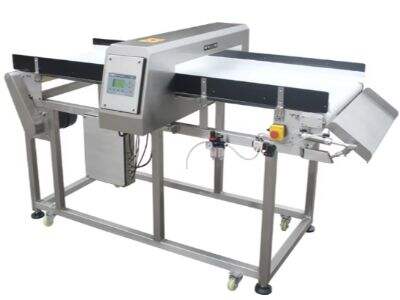Metal detectors are an example of a tool designed for this purpose that is used to identify any metal fragments found in food. This is why you want a good metal detector.
Sensitivity: Sensitivity is a term that pertains to the ability of the Food metal detector to pick up small metal targets. A more sensitive metal detector will detect much smaller bits of metal than a less sensitive one. This matters, because even a single piece of metal —let alone two very large ones— can pose harmful dangers if found inside your food. Therefore, while choosing a metal detector, opt for one with high sensitivity to ensure the safety of your food.
Specifications: You also have to consider the size of the metal detector. Metal detectors come in various sizes. Some are small and portable. We love these tiny detectors because they are portable for use in different locations. Although small detectors may not have the same readability on a smaller metal type as that of larger detectors. While larger detectors can be a bit less portable, they can often detect small metal fragments more efficiently. Consider where you plan on using the detector and how easy it is to transport.
Cost: Cost basically is an other consideration while selecting Metal Detector. A metal detector that does not break the bank. What this translates to is that you need to ensure you are not overspending. But equally, it is really important to ensure you are buying an effective quality metal detector. Well, with a less expensive metal detector it doesn't always preform as nicely and usually breaks faster. So, Try to balance cost vs quality to ensure your getting a long-lasting metal detector.
The Role of Metal Detectors in Food Processing: Selecting the Best Detector for You
Selecting the best metal detector may seem like a daunting assignment but is simplest if you have completed your homework. If you're having difficulty deciding, here are some tips to help you pick the right field.
Food Category — The first thing to consider when processing food in your plant. Some foods are easy to check for metal, others are less so. Wet or salty foods, for example, can obscure pieces of metal from detection by a metal detector. It is critical that the metal detector you select will actually be able to detect metal on the type of food being handled. It will not be of any use to you if it is unable to detect metal in your food.
Environment========The place you will be working with a Metal separator detector also plays a role in the selection. Some metal detector must handle moisture or wet, so if you are working in an area where it is very moist or wet, then you may need some special types of metal detector. That metal detector that plays nice in dry regions may not perform as good in wet locations. Well, consider your workplace conditions to ensure that metal detectors will be operational.
Size Production Line: Lastly, think about the size of your production line. If you have a production line where a lot of food is processed, you may need the option to scan more area with a metal detector that can be used for this purpose. If a detector is small its not going to be quick enough for the vast space. This ensures that the metal detector you purchase is fit for your line size to properly do its job.
How to Choose the Right Metal Detector for Food Safety
Gaining the trust of consumers in food processing requires priority on food safety. So, here is how to select the best metal detector that helps keep food safe for all:
FDA Approved: First of all, you want to check if the metal detector is FDA approved. Guidelines from the FDA on using metal detectors are designed to ensure these machines operate safely and effectively when used within the food industry. A good FDA approved metal detector has undergone thorough and critical safety checks before entering the market, you can be sure that it guarantees high standards for food.
Cleaning Ease — It is also necessary to choose an easy to clean metal detector. A metal detector needs to be cleaned from time to time so it can work smoothly. Not cleaning it often enough can be problematic, and that may happen because it is too difficult to clean. A metal detector specifically designed to be as easy to clean as possible will go a long way in simplifying this task for you and your crew.
Metal Detector Sufficient durability: Metal detector is a tool you will use often. Which is why, it is advisable to go with robust or strong one. You need that metal detector to work hard and last, without ever breaking or wearing. This ensures you will be able to keep it for years and get the job done of preserving all your foods.
Selecting the Right Food Metal Detector — Tips
It can be a bit tricky to find the right food metal detectors but here are some guidelines that can ease out your process:
Automatic Calibration – First of all seek out the best Industrial metal detector with auto-calibra-padding ation feature. So, you value that you do not have to provide it or readjust all of the time.
Various Settings: It is also essential to be selective when choosing a metal detector with multiple settings. To achieve proper functioning of the detector, it is essential to have different settings for different foods. This way, if you can change the configurations, you can use the detector for whatever food that is being processed. This will ensure that the detector can work on all kinds of foods effectively.
Simple to Operate: Finally, make sure you get a metal detector that is simple to operate and comfortable. Everyone on your team needs to understand it so it should have buttons and a display. A metal detector which is easy to use, also will help you train your team real easily and make sure everyone in the team can operate it without any confusion.
Things to Consider When Purchasing an Inline Metal Detector for Food Processing
Here are some tips to help you make the right choice when buying a metal detector.
Caution: The caution is an important measure of food processing. A less sensitive detector will just simply not detect harmful metal bits.
Wilcard: also its a good thinking to take metal detector that have spare parts available. So, if anything breaks you will be able to source it easily. This will help reduce your processing line downtime.

















































